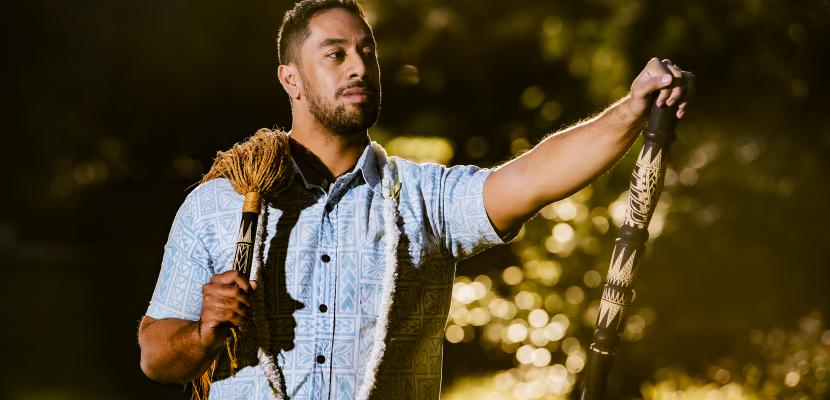
by Reon Suddaby
Mr Dion Enari speaks softly – but carries a message he hopes will echo through generations. The 31-year-old New Zealand-born Samoan recently submitted his PhD thesis exploring the perceptions of Fa’a Samoa (Samoan way) held by New Zealand-born Samoans living in Brisbane, Australia, bringing an end to nearly four years of study at Bond University.
But while Mr Enari may have come to the end of his immediate academic ambitions, his quest to preserve the language and culture of his homeland is only just beginning. It’s a task he takes seriously.
“I push the importance of the Samoan culture at all levels and in all ways that I can, whether it be speaking at public events, speaking to educators and policy makers and arguing and lobbying for implementing and including our languages and cultures in school curriculums, particularly where there are high Samoan and Pacific Island populations.” Mr Enari says.
“Any language can disappear within three generations if we’re not careful, particularly for our migrant communities.
It’s a very real threat and we’re seeing that it’s going to take a lot more than just asking people to speak the language at home, the language they speak at home should also be supported in curriculum as well, so they know there’s a home for their mother tongue beyond just their household, that it’s also supported in their place of education.”
As part of his research, Mr Enari interviewed New Zealand-born Samoans residing in Brisbane, exploring their perceptions of the Samoan culture and their lived experiences. He also spent time in the local Samoan community, observing how they used their language and practised their culture.
While expecting his research to show his participants identifying more strongly with Australia or New Zealand, he found that overwhelmingly they strongly identified as Samoan, first and foremost.
“Quite a lot of their values and beliefs were centred around Samoan values and beliefs, even though they were born outside of the motherland,” Mr Enari says.
He sees three critical steps in ensuring the Samoan culture continues to thrive: speaking Samoan, building connections between generations, and ensuring the diaspora living offshore return to Samoa as often as possible.
Mr Enari says the main issue confronting the future of Samoa was the relationship between those Samoans living offshore and those still on the island, in particular the ongoing dialogue over the country’s political future and the correct way to preserve Samoan language and culture.
The recent election of Samoa’s first female Prime Minister Fiame Naomi Mata’afa was a landmark occasion for Mr Enari.
“Samoa has many women leaders, we have many high chiefs, our greatest warriors were all women, so it’s an exciting time to see the potential of a Samoan female Prime Minister, and I support the movement of Samoan women leadership.”
The election was not without controversy, with Ms Mata’afa only confirmed as Prime Minister following a three-month political impasse with the caretaker government. The right to elect a government is one which is currently reserved only for those Samoans still living on the island. Despite being one of an estimated 500,000 Samoans living in New Zealand, Australia, the United States and elsewhere offshore, Mr Enari would like to see the status quo retained.
“Now there are more Samoans who reside overseas than live in the motherland, I believe there must be laws in place to protect the sovereignty of those who live on-island, to ensure they get full say on their political leaders that they have to live under, as opposed to the diaspora potentially taking over the way the election goes and not having to live with the consequences.
"It can be a bit unfair if you have Samoan people from Sydney, Auckland and Seattle calling the political future of those who live in the village and work in the plantations.”
For now though, Mr Enari’s own future lies a little closer to Samoa, having just moved to New Zealand to take up a role lecturing in Auckland University of Technology’s Faculty of Health & Environmental Sciences. He’s open to the prospect of making a permanent move back to Samoa one day, with a view to working either in government or back in his ancestral village.
But wherever Mr Enari’s journey takes him, his passion for his country and its culture will go with him.
“Many of the world’s problems and many of the world’s dilemmas that we face today can be answered by the knowledge, wisdom and guidance of Indigenous peoples and their knowledge systems. Indigenous peoples and their culture must not be viewed as a barrier to success but a carrier of success.
"We’re able to navigate the world and our futures, through our culture.”